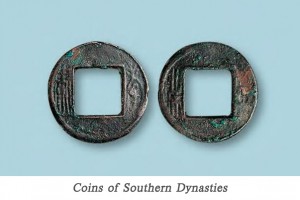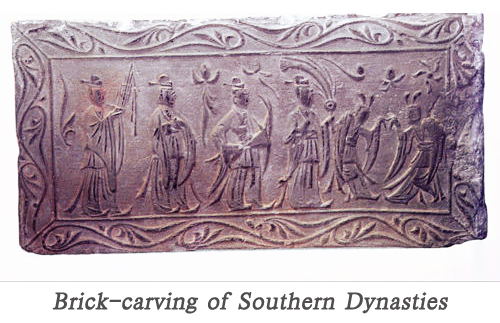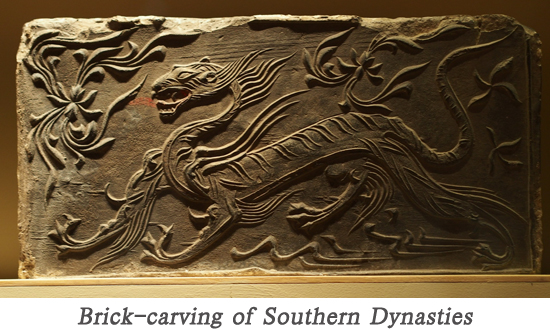Unlike the Northern Dynasties, where the north of China was largely controlled by two rival dynasties ruling concurrently, the Southern Dynasties was made up of four distinct, successive dynasties: the Liu Song Dynasty, the Southern Qi Dynasty, the Liang Dynasty, and the Chen Dynasty. Towards the end of the Eastern Jin Dynasty (317–420), the imperial court was teeming with political corruption and the empire had been crippled by brutal revolts. A rebel named Huan Xuan had captured the imperial capital and dethroned the reigning Emperor An, claiming power for himself. Only one man rose to stop him; a decorated military general named Liu Yu. It was Liu Yu who had earned a victory for the Eastern Jin during the Battle of Fei River in 383, and it was Liu Yu who suppressed Huan Xuan’s rebellion and restored Emperor An to the throne.
Yet Liu’s intentions weren’t as benevolent as they first seemed. In 416, he led a number of expeditions against the Sixteen Kingdoms (303-439), successfully capturing the provinces of Shandong and Henan. He did this not to expand the Eastern Jin Empire, but to prepare a larger empire for himself. In 419, he had Emperor An strangled and placed the pliable Emperor Gong on the throne in his stead. Within one year, he forced Emperor Gong to abdicate and crowned himself Emperor Wu of the Liu Song Dynasty (420–479), the first of the Southern Dynasties.
Emperor Wu was well-known for his frugality and eschewed the extravagance of previous emperors. On his death, he was succeeded by his son Emperor Shao, who was deemed unfit to rule and was assassinated by a band of government officials. They replaced him with another of Emperor Wu’s sons, Emperor Wen, who quickly repaid their kindness by having them all killed. Fool an Emperor once, shame on you; try to fool an Emperor twice, and he’ll have you executed! Like his father, Emperor Wen was characterised by his frugality and adept skills at governing, leading to a period of prosperity and political stability known as the Reign of Yuanjia.
Emperor Wen desperately tried to continue the military campaigns of his father, but unfortunately his talent in government was matched only by his military incompetency. His failure to deal with the threat of the barbarian kingdoms in the north allowed the Northern Wei Dynasty (386–535) to complete their domination of northern China in 439. With the northern territories unified under their rule, the Northern Wei became a significant threat to the Liu Song.
 Out of jealousy, Emperor Wen made the fatal mistake of having his celebrated military general, Tan Daoji, executed and attempted to take his place, drafting his own battle plans and requiring that generals receive direct approval from him regarding any military manoeuvres. It was his overbearingness that led to the decline of the empire, as the Northern Wei army were able to occupy provinces south of the Yellow River and cause the Liu Song irrecoverable economic losses. In 453, he was assassinated by his own son, Liu Shao. This caused an uproar in the imperial court, as Liu Shao had violated one of Confucianism’s fundamental principles: filial piety.
Out of jealousy, Emperor Wen made the fatal mistake of having his celebrated military general, Tan Daoji, executed and attempted to take his place, drafting his own battle plans and requiring that generals receive direct approval from him regarding any military manoeuvres. It was his overbearingness that led to the decline of the empire, as the Northern Wei army were able to occupy provinces south of the Yellow River and cause the Liu Song irrecoverable economic losses. In 453, he was assassinated by his own son, Liu Shao. This caused an uproar in the imperial court, as Liu Shao had violated one of Confucianism’s fundamental principles: filial piety.
Liu Shao was then overthrown and beheaded by his equally cruel brother, Liu Jun, who named himself Emperor Xiaowu. Throughout his reign, his vicious nature and lustful misdeeds prompted two separate rebellions. It was rumoured that he committed incest with his cousins, sisters, nieces, and even his mother. Talk about keeping it in the family! On his death in 464, there followed a sequence of emperors that only equalled him in viciousness: his son, Emperor Qianfei, who was also fond of incest and familicide; Emperor Qianfei’s uncle, Emperor Ming, who assassinated Emperor Qianfei and executed thousands of his own relatives; and Emperor Ming’s son, Emperor Houfei, who had to be assisted by a military general named Xiao Daocheng because Emperor Ming had killed nearly all of his male relatives. It was a veritable imperial train wreck!
In the end, Xiao Daocheng used the environment of instability to amass power and eventually deposed Emperor Houfei in favour of his brother, Emperor Shun. When Xiao finally defeated his major political rival, General Shen Youzhi, he forced Emperor Shun to abdicate and crowned himself Emperor Gao of the Southern Qi Dynasty (479-502). His short reign was marked by its prudence but, after just four years, he died of natural causes and the throne was passed on to Emperor Wu. By reconciling with the Northern Wei, it was Emperor Wu who brought about an era of peace known as the Yongming Administration. Yet, as we’re sure you’ve guessed, peace was not a common occurrence during the Northern and Southern Dynasties Period!
After Emperor Wu passed away, his grandson Xiao Zhaoye ascended to the throne, but was swiftly assassinated by Emperor Wu’s cruel, cunning, and paranoid cousin, Xiao Luan. He took the throne as Emperor Ming and executed all of Emperor Gao’s and Emperor Wu’s descendants, as well as several government officials. On his death, his son, Xiao Baojun, followed suit. As the old saying goes, like father, like son! Baojun’s unpredictable and vicious actions sparked numerous revolts, and he was eventually overthrown by a rebel leader named Xiao Yan. In a bizarre twist of fate, it turned out that Xiao Yan and Xiao Baojun were actually very distant relatives! Yan then enthroned himself as Emperor Wu of the Liang Dynasty (502-557).
Emperor Wu was celebrated as an economical and diligent leader who cared for the common people and bolstered the empire’s military strength. He was a learned man who advocated the importance of cultural exchange and had an obsessive fondness for Buddhism. On three separate occasions, he even tried to renounce his title and become a monk instead! His donations to Buddhist temples, coupled with his enduring adoration for Buddhism, greatly helped bolster the popularity of the religion in the south of China.
Yet every leader must have their tragic flaw. During his later years, Emperor Wu would willingly listen to flattery from treacherous officials. His innocent love of Buddhism was taken advantage of, as nearly half of his subjects fraudulently declared that they were monks simply to exploit laws that exempted them from taxes. He also offered amnesty to generals who had defected from the Northern, Eastern (534–550), and Western Wei (535–557) dynasties, which usually worked to his benefit. However, when he took on the rebel commander Hou Jing of the Eastern Wei, it would turn out to be both a blessing and a curse.
Hou Jing led a series of northern expeditions against rival dynasties, which had initial successes but were eventually defeated. After his failure, rumours abounded that Emperor Wu was planning to give Hou up as a peace offering. Despite the Emperor’s assurances, Hou decided to rebel and besieged the imperial capital of Jiankang (modern-day Nanjing). When Hou finally captured the palace, Emperor Wu tragically starved to death and Hou seized power.
However, Hou only controlled the areas surrounding Jiankang and his political reach was extremely limited. Xiao Yi, a descendent of Emperor Wu, managed to defeat him with the help of his generals Wang Sengbian and Chen Baxian, and re-established the Liang Dynasty as Emperor Yuan. However, when an alliance between the Liang and the Western Wei turned sour, Emperor Yuan was deposed and sadly died.
Meanwhile, the Northern Qi Dynasty (551–577) sent a cousin of Emperor Yuan, Xiao Yuanming, to the Liang court in the hopes of gaining the throne. After some military defeats against the Northern Qi, Wang Sengbian decided to allow the pretender Xiao Yuanming to establish himself as Emperor Min of Liang. Chen Baxian was so enraged by Wang’s actions that, in a shocking move, he killed Wang, deposed Emperor Min, and installed Emperor Yuan’s son Xiao Fangzhi as Emperor Jing. After a brief reign, Chen forced Emperor Jing to abdicate and instated himself as Emperor Wu of the Chen Dynasty (557-589). This was the only dynasty in Chinese history to be named after the ruling family.
Unfortunately, by the time Emperor Wu took power, the empire was exceedingly weak and possessed only a small portion of the territory it once held. Emperor Wu’s successors, Emperor Wen and Emperor Xuan, proved to be capable rulers and gradually expanded this territory through military efforts and good governance. However, events took a turn for the worse when the Northern Zhou Dynasty (557–580) conquered Northern Qi in 577. During this time, Emperor Xuan passed away and was replaced by his incompetent and selfish son, Chen Shubao.
After Yang Jian usurped the Northern Zhou throne and established the Sui Dynasty (581-618), he embarked on an invasion of southern China. In 589, after a year-long military campaign, Yang Jian captured the Chen capital of Jiankang and subsequently ended the Chen Dynasty. For the first time in over 300 years, China was formally united under one ruling family. Although the Sui Dynasty would be short-lived, it paved the way for a golden era in Chinese history known as the Tang Dynasty (618–907).

